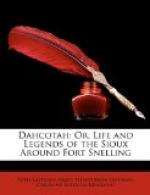When tired of admiring the scenery, there was enough to employ us. The table was to be set for dinner; the children had already found out which basket contained the cake, and they were casting admiring looks towards it.
When we were all assembled to partake of some refreshments, it was delightful to find that there were not enough chairs for half the party. We borrowed each other’s knives and forks too, and etiquette, that petty tyrant of society, retired from the scene.
Shah-co-pee found his way to the cabin, where he manifested strong symptoms of shaking hands over again; in order to keep him quiet, we gave him plenty to eat. How he seemed to enjoy a piece of cake that had accidentally dropped into the oyster-soup! and with equal gravity would he eat apple-pie and ham together. And then his cry of “wakun” [Footnote: Mysterious.] when the cork flew from the champaigne bottle across the table!
How happily the day passed—how few such days occur in the longest life!
As Shah-co-pee’s village appeared in sight, the chief addressed Col. D——, who was at that time in command of Fort Snelling, asking him why we had come on such an excursion.
“To escort you home” was the ready reply; “you are a great chief, and worthy of being honored, and we have chosen this as the best way of showing our respect and admiration of you.”
The Dahcotah chief believed all; he never for a moment thought there was anything like jesting on the subject of his own high merits; his face beamed with delight on receiving such a compliment.
The men and women of the village crowded on the shore as the boat landed, as well they might, for a steamboat was a new sight to them.
The chief sprang from the boat, and swelling with pride and self admiration he took the most conspicuous station on a rock near the shore, among his people, and made them a speech.
We could but admire his native eloquence. Here, with all that is wild in nature surrounding him, did the untaught orator address his people. His lips gave rapid utterance to thoughts which did honor to his feelings, when we consider who and what he was.
He told them that the white people were their friends; that they wished them to give up murder and intemperance, and to live quietly and happily. They taught them to plant corn, and they were anxious to instruct their children. “When we are suffering,” said he, “during the cold weather, from sickness or want of food, they give us medicine and bread.”
And finally he told them of the honor that had been paid him. “I went, as you know, to talk with the big Captain of the Fort, and he, knowing the bravery of the Dahcotahs, and that I was a great chief, has brought me home, as you see. Never has a Dahcotah warrior been thus honored!”
Never indeed! But we took care not to undeceive him. It was a harmless error, and as no efforts on our part could have diminished his self importance, we listened with apparent, indeed with real admiration of his eloquent speech. The women brought ducks on board, and in exchange we gave them bread; and it was evening as we watched the last teepee of Shah-co-pee’s village fade away in the distance.




